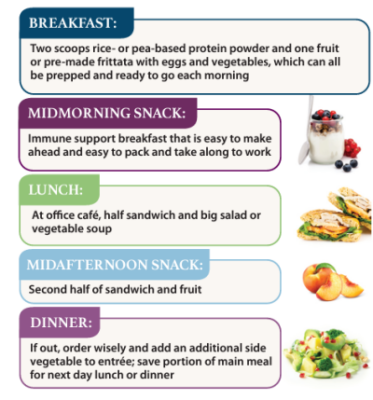Case Study Excerpt: Supporting Immune Resilience in Patients

Patient Information
Jackie is a 32-year-old woman living in a northern suburban city. She recently bought her first home where she lives alone with her dog. She works as a project manager for a small local company and spends most of her evenings out with her friends.
- Race/Ethnicity: White/Caucasian
- Marital Status: Single, no children
- Problems: History of depression and anxiety
- Allergies: None
Social History
- Alcohol: 1-2 drinks most days, more on some weekends
- Smoking: Quit smoking one year ago
Vital Signs
- Height: 63 inches (5’3)
- Weight: 135 pounds
- BMI: 23.9
- Non-fasting glucose: 110
- Blood pressure systolic: 130 mm Hg
- Blood pressure diastolic: 80 mm Hg
- Total cholesterol: 175
- HDL cholesterol: 59
Medications
- Antidepressant
- Anti-anxiety
Health Concerns
- Frequent illness (colds, sore throats)
- Mental health
- Low energy
- General wellness
Practitioner Perspective: Kim Furtado, ND
Kim’s philosophy is to “treat what we learn.” Instead of trying to address every aspect that can be contributing to Jackie’s symptoms, Kim would work to uncover pertinent, relevant factors impacting Jackie’s health. What they learn from laboratory data would create a clear path toward resolution and healing.
First Visit
During the first visit, Kim would focus primarily on health history. Using a general intake form that Jackie would fill out ahead of time, Kim would review her chief complaints of anxiety, depression, frequent infection, and low energy. Kim asks her patients leading questions to have them describe the severity, frequency, and characteristics of their symptoms. Kim would also do a review of symptoms to help understand any other current or past symptoms that Jackie has experienced that may not have been included in her key concerns but may be relevant.
Kim would also inquire about sources of stress in Jackie’s life, as well as how she recognizes stress. They would discuss a typical day’s worth of food, review her work schedule, and inquire about Jackie’s sleep quality. This initial visit would serve to develop rapport with Jackie and would be mostly spent listening to her.
Initial Care Plan
An initial plan for Jackie would be focused on her chief complaints. Kim would present to her the functional medicine tree metaphor and describe how the body has an innate ability to heal itself. When we treat the root issues, or determinants of health, the body has an ability to resolve signs and symptoms. When we only focus on treating symptoms, we don’t achieve deep healing and resolution, Kim said.
Kim would review issues and discuss which roots or determinants they would like to focus on for Jackie. With fatigue and frequent infection, Kim said she would likely focus on stress and resilience including hormone balancing, environmental pollutants, and the microbiome. Nutritional status, as well as sleep and relaxation, would also be key areas for Jackie.
Jackie’s initial care plan would include a basic antioxidant formula with adequate vitamins C, E, selenium, and zinc, as well as thymus glandular extract to support her immune function, while they determine what underlying imbalances may be weakening her immune system. Kim would also start her on Eleutherococcus (ginseng) solid extract as a gentle adrenal and immune tonic.

Kim would provide Jackie with recommendations for remedies to have on hand if she began to feel the onset of an infection. She would give Jackie information on lifestyle and nutrition modifications to make when symptoms start, including restricting all simple sugars and alcohol.
An herbal formula with immune boosting herbs like echinacea, hydrastis, and berberine would be prescribed if symptoms began. Kim would also advise Jackie to take four to six grams of vitamin C in divided doses each day as needed.
For Jackie’s nutrition, Kim would try to make suggestions that meet her where she is regarding meal preparation and cooking but would also remind her that what she is doing now with food is likely not helping her immune system. Kim would encourage small changes that could make a big impact.
Blood sugar irregularities are likely based on her fasting glucose, and this can adversely affect immune function, Kim said. Helping her avoid low blood sugar levels by eating within 30 minutes of waking and every three hours with adequate protein would likely improve her energy levels.
Case Considerations
Given Jackie’s reported history of Adverse Childhood Experiences (ACEs), Kim said it would be important to investigate whether her hypothalamus, pituitary, or adrenal HPA axis is imbalanced. Kim would order a salivary cortisol and dehydroepiandrosterone (DHEA) circadian test to understand any underlying adrenal gland imbalances.
With Jackie’s limited time, Kim would tailor the initial plan around her normal on-the-go habits. In her follow up visit, Kim would discuss Jackie’s response to treatment and do a review of findings. If her adrenal hormones are imbalanced, they would then discuss the principles of adrenal restoration. Kim said it would be important to understand the effects of chronic stress and the impact Jackie may be experiencing.
Through dialogue and conversation, Kim and Jackie would explore her history of bouncing back and forth between households, and the metaphor of convenience and inconvenience. For example, how convenient is it to be sick frequently? They would explore how her current self-care reflects the instinct for self-care that was never modeled or valued in her upbringing. They would also discuss how the body speaks through the language of symptoms and explore what messages fatigue and frequent infection may be expressed in her.
Kim would utilize several tools, based on Jackie’s interest and process. Kim said that she tries to empower patients to know that when they are in a fight or flight response or sympathetic nervous system, the body is too busy reacting to stress, with increased tension, stress hormones and neurotransmitters. Parasympathetic functions like digestion, sleep, repair of tissues, and immunity are downregulated. Kim said she would try to empower patients to invest time in relaxation or restorative practices which promote rest, digest, repair, and optimal immune function.
In addition to testing Jackie’s adrenal status, Kim would recommend several additional tests that are critical for assessing immune status:
- Vitamin D (25-hydroxycholicalciferol)
- Blood glutathione (GHS)
- Basal Body Temperature (if lower than 97.5, order follow-up thyroid panel)
- Full thyroid panel (THS, T4 direct, T3 free)
- Complete blood count (CBC) and ferritin
- Urine toxic elements profile
- Stool culture
Priorities for testing could be set based on Jackie’s budget. Kim would use any testing to evaluate her nutritional status, environmental pollutants, as well as stress and resilience.
If there is a significant toxic burden, treatment goals would include detoxification, which would help Jackie with mitochondrial function and energy levels. Her history of smoking also indicates a need for improved liver support and detoxification.
If there are significant key nutrient deficiencies, Kim would target restoration of those nutrients, such as vitamin D, glutathione, and iron. Jackie’s history of smoking could also contribute to potential nutritional deficiencies. They would address nutrition to expand into more meal preparation, which includes a wider array of fresh vegetables, fruits, whole grains, beans, nuts, and high-quality protein.
If there were low thyroid function or low body temperature, Kim said this could also contribute to Jackie’s main concerns. A subclinical hypothyroidism can be induced in the days prior to menses. Given Jackie’s report that she gets sick every month, Kim said this would be worth investigating. Good liver support and detoxification could also help this if the hormone burden of her menses were interfering with adequate tissue levels of T3. This could create an immune suppression, Kim said.
If there were intestinal dysbiosis, such as the presence of intestinal yeast or imbalance in the gram negative and gram-positive microflora, Jackie’s treatment plan would also address this. Depending on the toxic burden status, Kim would potentially use anti-microbial herbs like oregano, barberry, caprylic acid, or garlic to help reduce any potentially pathogenic microbes, followed by introduction of probiotics through supplements, fermented foods, and increased fiber and plant-based nutrition.
Long-Term
Kim said long-term goals for Jackie would include a reduction in the frequency of infection, as well as reduction in severity. Kim said they may see a reduction in frequency, followed by a lessening of the severity or duration of each infection as the immune system becomes stronger.
Within four to six weeks, an increase in stamina and energy is also expected. Long-term goals would include stable, adequate energy levels for Jackie to enjoy her life, be active with her friends, and stay productive at work.
Another long-term goal would be to empower Jackie to improve her ability to listen to her own body. As Jackie is an independent person who is used to pushing through to achieve goals, Kim would try to help her appreciate her existing coping skills are less appropriate for optimum health and self-care. By helping her assess her priorities, they would establish new skills and coping tools.
Time for meal preparation and a new relationship to food and nourishment would be fostered. Kim said they discuss making meal preparation a social time with her friends to work together one night per week to cook and pack lunches together. Additionally, resting when tired, not pushing past limits, and valuing relaxation would be tools she could use to unlearn childhood coping skills.
About the Expert

Kim Furtado, ND, received her Doctor of Naturopathic Medicine (ND) degree from Bastyr University in Kenmore, Washington in 2000. She holds a Bachelor of Science Cum Laude in Biology from George Washington University in Washington, D.C. Inspired by the healing power of naturopathic medicine, she has been in private practice in Lewes, Delaware since 2001. Her special interests include herbal medicine, nutrition, environmental medicine, chronic illness, and women's and children's health. She enjoys serving as a community resource and effective educator of lifestyle changes. She is a member of the American Association of Naturopathic Physicians (AANP). She is a founding director for the Delmarva Community Wellnet Foundation, and garden coordinator for their SNAC Garden Program. She views healing as an active journey on which she is honored to travel with each person. She is dedicated to naturopathic principles and the knowledge that all medicine begins with prevention.
Editor’s Note: This is an excerpt from the e-book, Supporting Immune Resilience in Patients: An Integrative Medicine Case Study. To read more, click here.




















SHARE